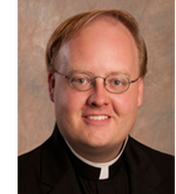|
We are continuing our examination of the sacraments and moving forward on our consideration of the Sacrament of Holy Orders. In our last article we examined the reality of Christ’s own priesthood – that He is the Great High Priest. In order to understand who the priest it was necessary to understand Christ as Priest, since a priest is given a share in this priesthood and is meant to be another Christ – sacerdos alter Christus.
As we begin our examination of the priest as another Christ we must begin with an understanding of the sacramental character which is impressed on the soul by the Sacrament of Holy Orders. The effect of all the sacraments is to bind us more intimately to Christ and for priests this means being given a share in the priesthood of Christ. Sanctifying grace, along with the special characters of baptism, confirmation and holy orders are meant to perfect in the soul of the priest his resemblance to Christ. This sacramental character also consecrates him as one of Christ’s ministers and so, once again, both in who he is and what he does the priest resembles Christ in a particular and magnificent way. This sacramental character also invests the priest with spiritual powers. These powers are numerous – the first is that the priest is given power over the Body of our Lord (the Eucharist) and the Mystical Body of Our Lord (the Church). It is the priest who has the power to transform the bread and wine into the Sacred Body and Blood of Our Lord and to distribute the Eucharist and to guard the Eucharist from profanation and sacrilege. The priest also is given authority in the Church, to govern the people entrusted to his care according to Canon Law and in obedience to his bishop or superior. Furthermore the priest is also granted other powers by virtue of his ordination. The priest becomes a mediator between God and men, he both lifts up in prayer the needs of the members of the Church and with the use of the hands of the priest God gives His grace to the members of the Church. The priest intercedes on behalf of the people who are entrusted to his care. This is the origin of the fact that a Mass is offered each Sunday for the parishioners of the parish, this is a duty and an obligation of the priest to make sure a Mass for the people is offered every Sunday and Holy Day. We see the powers of the priest extend to the pardoning of sins. We have discussed, in the past, the Sacrament of Reconciliation and we see that it is the priest who is the minister of this sacrament. He has been given the “power of the keys” – to bind and loose human beings from their sin through the sacrament of penance. We can see, then, how the sacramental character of Holy Orders becomes a source of abundant grace for the priest and his work. This sacramental character is an indelible seal on the soul of the priest making him and calling him to be another Christ – a living reproduction of Christ with an eternal resemblance to Him and one who is completely consecrated to God. In our next article we will examine three specific ways the priest resembles Christ. (This article is part of a series of articles on The Sacraments which will appear in the bulletin over the course of this year.) Comments are closed.
|
Fr. PeterArchives
June 2023
Categories |
Join us at MassSaturday at 4pm;
Sunday at 7:30am, 9:00am, 10:30am Daily Masses: Monday-Friday 6:30am Tuesday/Friday 8::00am (school days only) Saturdays 8:00am Sacrament of Reconciliation |
|


 RSS Feed
RSS Feed
